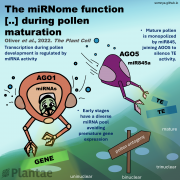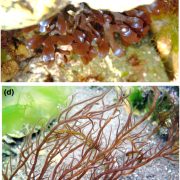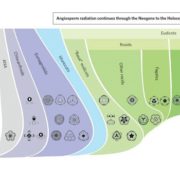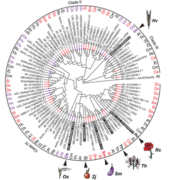Review: The domestication syndrome in vegetatively propagated field crops (Ann. Bot.)
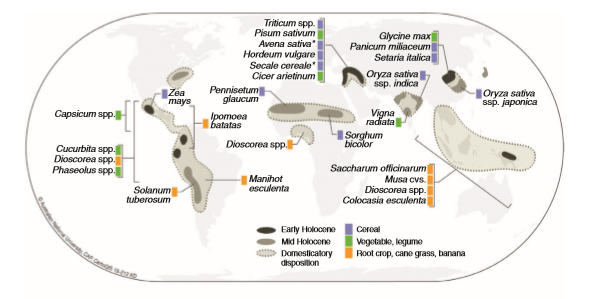 Archeological remains and genetic analyses of ancient DNA have revealed that the loss of seed dispersal marks the onset of domestication for sexually reproduced crops such as cereal, legume and oils seed crops, for which annual cultivation is based on sowing seeds. In contrast, less is known about the domestication of vegetatively propagating plants including sugarcane, bananas and root crops, for which perennial cultivation relies on clones obtained by parthenogenesis or regeneration from fragments of vegetative structures. In Denham et al., the authors pinpoint the shift towards asexual reproduction as the main convergent evolutionary trait in vegetatively propagated crops; humans selected variants with reproductive dysfunction that originated through natural processes (e.g., spontaneous mutations, hybridization and polyploidization), and propagated plants with seedless fruits and sterile polyploid (including triploid banana and polyploid sugarcane). Other traits associated with domestication include increased yield of the edible portion and greater ease of harvesting. Vegetatively propagated plants show great phenotypic variation which can be associated with developmental plasticity rather than genotypic diversity, therefore, many morphological changes may be due to dynamic expression of phenotypic traits in response to growth environment and cultivation practices. (Summary by Michela Osnato) Ann. Bot. 10.1093/aob/mcz212
Archeological remains and genetic analyses of ancient DNA have revealed that the loss of seed dispersal marks the onset of domestication for sexually reproduced crops such as cereal, legume and oils seed crops, for which annual cultivation is based on sowing seeds. In contrast, less is known about the domestication of vegetatively propagating plants including sugarcane, bananas and root crops, for which perennial cultivation relies on clones obtained by parthenogenesis or regeneration from fragments of vegetative structures. In Denham et al., the authors pinpoint the shift towards asexual reproduction as the main convergent evolutionary trait in vegetatively propagated crops; humans selected variants with reproductive dysfunction that originated through natural processes (e.g., spontaneous mutations, hybridization and polyploidization), and propagated plants with seedless fruits and sterile polyploid (including triploid banana and polyploid sugarcane). Other traits associated with domestication include increased yield of the edible portion and greater ease of harvesting. Vegetatively propagated plants show great phenotypic variation which can be associated with developmental plasticity rather than genotypic diversity, therefore, many morphological changes may be due to dynamic expression of phenotypic traits in response to growth environment and cultivation practices. (Summary by Michela Osnato) Ann. Bot. 10.1093/aob/mcz212


